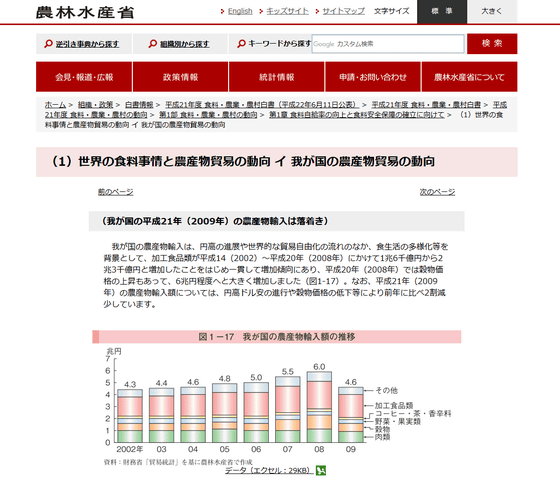Research results that climate change has a severe impact on agriculture and fisheries

By
In recent years, the issue of climate change such as global warming has become an urgent issue, and various studies have been conducted on the impact of climate change on daily life. Meanwhile, a study result was announced that in 2100, climate change will reduce agricultural productivity by 25% and fishery productivity by 60% .
Escaping the perfect storm of simultaneous climate change impacts on agriculture and marine fisheries | Science Advances
https://advances.sciencemag.org/content/5/11/eaaw9976
Climate explained: how climate change will affect food production and security
https://theconversation.com/climate-explained-how-climate-change-will-affect-food-production-and-security-128106
“Decrease in temperature” is important for many temperate crops. Plant flowering and fruit ripening are caused by lowering temperatures, and lowering temperatures also has the advantage of reducing disease and insect damage. Therefore, temperate crops are hit when the temperature rises due to global warming. In addition, the rise in seawater temperature is causing a decrease in the amount of oxygen dissolved in the sea, and the “dead zone” in which most marine organisms cannot live is increasing in the world.
Scientists warn that the `` dead zone '' without oxygen in the sea is spreading four times compared to 1950 and affecting the ecosystem-GIGAZINE

By
A study conducted by international teams such as France, Australia, Canada, and the United Kingdom says that “predicting how climate change will affect future agriculture and fisheries”. Based on multiple studies, such as research on fisheries, climate change and biodiversity announced in 2012, and research on the relationship between climate change and the food system, the research team Changes in agriculture and fisheries when the process continued.
As a result, RCP8.5 , which is assumed by the Intergovernmental Panel on Climate Change (IPCC) to be the “highest greenhouse gas emission scenario in 2100”, shows that agricultural productivity in 2100 is 2001 Compared to the year, it will decrease by 5% to 25%, and fishery productivity will decrease by 15% to 60%. In the world map below, comparing 2001 and 2100, the red is the “region where productivity is low” and the blue is the “region where productivity is high”. The map showing the productivity of “agriculture” on the left shows that developing countries such as Africa, Southeast Asia, and South America are particularly severely hit. On the other hand, the map showing the productivity of “fisheries” on the right shows that Southeast Asian fisheries are hit harder than South America and Africa.

The research team states that if climate change as envisaged in RCP8.5 occurs, there will be problems with food conditions in over 90% of the world population.
Japan produces 80% of domestically consumed vegetables (PDF file) in
(1) Global food situation and trends in agricultural trade a) Trends in Japanese agricultural trade: Ministry of Agriculture, Forestry and Fisheries
http://www.maff.go.jp/j/wpaper/w_maff/h21_h/trend/part1/chap1/c1_02.html

Related Posts:







